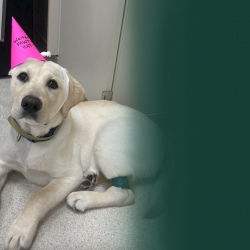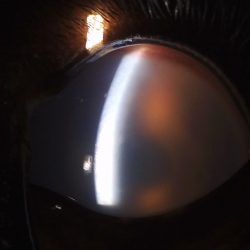History and Diagnosis
A seven-year-old Labrador cross from Israel named Rocco was presented to Michigan State University Veterinary Medical Center (MSU VMC) Oncology service to discuss treatment options for his recently diagnosed thyroid carcinoma. Six months previously, Rocco’s owner had noticed enlargement in the laryngeal area of his neck. This was confirmed by his local veterinarian, as well as cervical node enlargement being noted. Additional chest radiographs revealed the presence of a few pulmonary nodules. Biopsy revealed the cervical mass to be consistent with solid thyroid carcinoma. Thyroid levels (T4) were within the normal range at that time. The owner noted that throughout the process, Rocco had not exhibited any behavioral changes. Rocco was up-to-date on all vaccines, and he had no prior history of malignant disease.
Treatment and Outcome

In search of specialist care, Rocco’s owner reached out to Dr. Paulo Vilar of the MSU VMC Oncology Service. Dr. Vilar confirmed the Service’s capability to assess and potentially treat Rocco, so Rocco and his owner traveled to MSU from Israel for a visit to the States.
Following examination at MSU VMC, Rocco’s assessment included chest radiographs and a technetium scan. Throughout the entire pulmonary parenchyma, there were multifocal and well-defined round soft-tissue masses of various sizes that were too numerous to count. The cardiovascular structures were unremarkable. These results were interpreted as multifocal pulmonary metastasis, secondary to the known thyroid carcinoma.
Vilar administered 3 mCi of technetium-99m pertechnetate and static images were obtained of the neck, thorax, and abdomen 20 minutes post injection. Within the ventral midline cervical region, just cranioventral to the thyroid glands, a large lobular mass was present with marked heterogeneous uptake. The thyroid and parathyroid glands were normal in size and uptake. A few round, variously-sized regions had moderate uptake in the thorax. No abdominal uptake was observed. This was interpreted as a large ventral cervical region mass, representing neoplasia, ectopic thyroid carcinoma, with pulmonary metastasis.
Rocco was injected subcutaneously with Iodine 131. The patient was then placed in isolation for 14 days until his radioactivity levels had reached a safe point. The Iodine 131, which has a short life span, is absorbed by the thyroid malignant cells, where it disintegrates. The compound releases energy upon disintegration that damages the cells’ DNA and induces cell death. This method provides a less invasive and more targeted treatment than other alternatives to the systemic disease.
Comments
Thyroid carcinoma is a cancer of the epithelial cells that are located in and around the thyroid gland. About 60% of dogs with thyroid neoplasia are euthyroid, 30% are hypothyroid, and 10% are hyperthyroid. Thyroid tumors account for 1.2% to 3.8% of all tumors in dogs. Most of the canine thyroid tumors are considered to be malignant and up to 35% of dogs have visible metastatic disease at initial presentation, and as many as 80% ultimately develop metastasis later in the course of disease. The lungs and regional lymph nodes are most often affected. Based on Rocco’s thoracic radiographs, there is obvious metastasis in his lungs.
Treatment for thyroid carcinomas must focus on control of both the local disease (the thyroid mass) and the systemic (metastatic) disease. Local treatment options include surgery, radiation, and/or radioactive iodine therapy (I131). Systemic treatment is usually done with chemotherapy, molecular targeted therapy, or radioactive iodine (I131).
Iodine 131 is a radioactive substance administered systemically based on the theory that iodine will be trapped in the thyroid tissue, as well as any metastatic foci, making this a relatively selective therapy. The limited studies available in dogs suggest a benefit to this therapy. MSU is one of the only veterinary medical facilities in the United States able to provide this compound to dogs. Rocco’s prognosis would have been grave if not for the therapy received. While metastatic thyroid carcinomas are incurable, adjuvant therapies (I131 or chemotherapy) may help to reduce the progression of the disease and to increase survival time and quality of life. Rocco is currently enjoying life in Israel more than six months after treatment, despite massive pulmonary metastatic disease.



